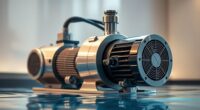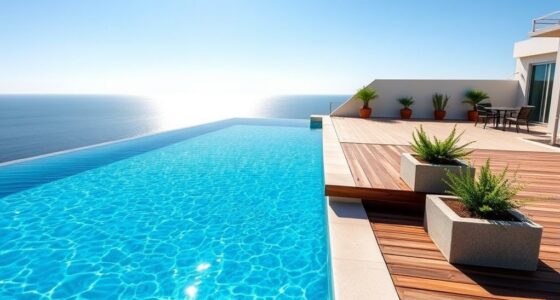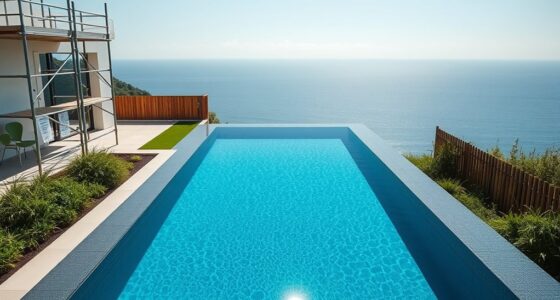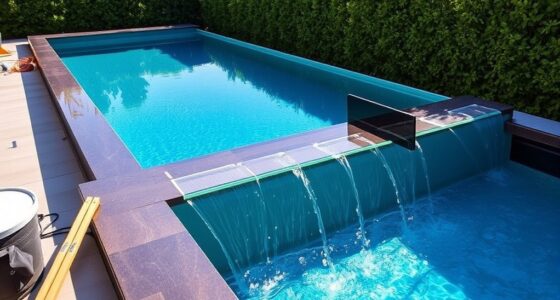To heat your infinity pool efficiently, consider installing solar panels for eco-friendly savings or a heat pump for steady warmth with lower energy use. Use a high-quality pool cover to reduce heat loss, and insulate pool edges and the bottom for better retention. Combining smart controls with proper maintenance maximizes efficiency and cuts costs. If you’re curious about choosing the best system and eco-friendly tips, there’s more to explore here to help optimize your pool heating.
Key Takeaways
- Opt for solar pool heaters or heat pumps for eco-friendly, cost-effective, and efficient long-term heating solutions.
- Use high-quality pool covers and insulation to minimize heat loss and boost overall energy efficiency.
- Combine a suitable heating system with smart controls and automation to optimize operation and reduce energy consumption.
- Regularly maintain and clean your heating equipment to ensure optimal performance and longevity.
- Consider your climate and pool usage to select the most efficient system—solar and heat pumps work best in moderate climates.
Choosing the Right Pool Heating System
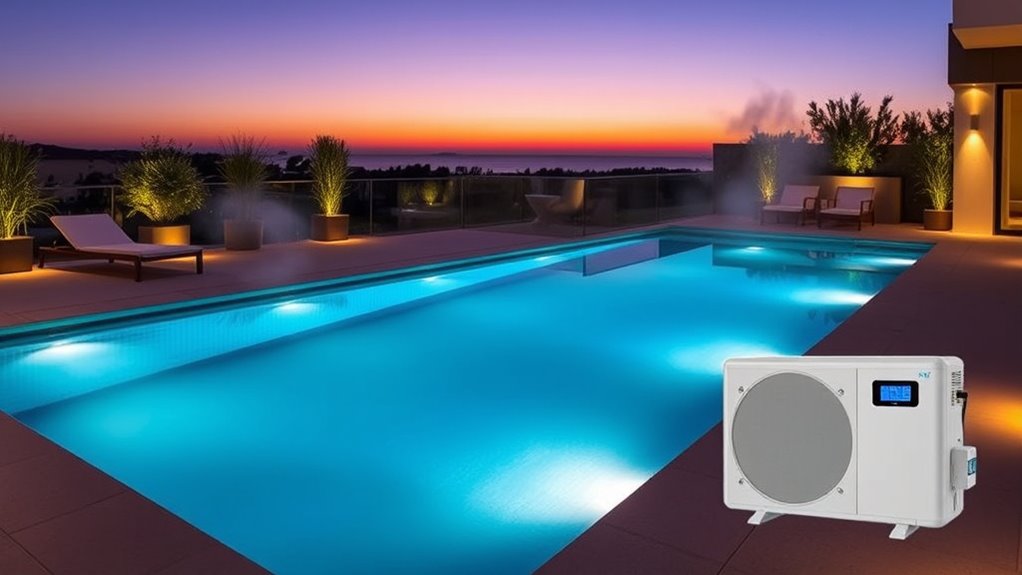
Choosing the right pool heating system is essential for maintaining a comfortable infinity pool without wasting energy. You need to take into account your pool size, climate, and usage frequency to select the most efficient option. Gas heaters heat quickly, making them ideal for occasional use, but they can be costly to operate. Electric heat pumps are more energy-efficient and work well in moderate climates, providing consistent warm water. Solar pool heaters are eco-friendly and cost-effective but depend on sunlight, making them less reliable in cloudy weather. You should also evaluate installation costs, maintenance needs, and your budget. By analyzing these factors, you’ll ensure your infinity pool stays inviting while keeping energy consumption and costs under control. Additionally, considering the efficiency and performance of geothermal systems can offer long-term savings and sustainability benefits for your pool heating needs.
Solar Heating Solutions for Infinity Pools

Solar heating can be an efficient way to warm your infinity pool, but it’s important to contemplate panel efficiency and how you position them for maximum sunlight. Proper placement and orientation can markedly boost energy absorption, saving you money in the long run. Keep in mind that while initial costs and maintenance are factors, a well-designed solar system can provide reliable, eco-friendly heat for years. Selecting high-quality mattress toppers can also enhance comfort during poolside relaxation.
Solar Panel Efficiency
Have you ever wondered how to maximize the efficiency of solar panels for heating your infinity pool? Your goal should be to select high-quality panels with ideal wattage and minimal energy loss. Regular maintenance, like cleaning dust and debris, can greatly boost performance. Using unglazed polycrystalline or thin-film panels often offers better efficiency in warmer climates. To help you compare options, here’s a quick overview:
| Panel Type | Efficiency Rating |
|---|---|
| Monocrystalline | 15-20% |
| Polycrystalline | 13-16% |
| Thin-Film | 10-12% |
| Unglazed Panels | 50-70% of glazed panels |
Choosing the right panel type and maintaining it properly ensures you get the most heat from the sun, saving energy and costs. Proper solar panel installation and system optimization are critical for maximizing efficiency and longevity.
Placement and Orientation
Maximizing the heat your infinity pool receives depends heavily on how you position and orient your solar panels. Proper placement guarantees maximum sunlight exposure throughout the day, boosting efficiency. First, position panels where they’ll face south (or north if you’re in the southern hemisphere) to catch the most sunlight. Second, tilt the panels at an angle equal to your latitude for ideal solar capture. Third, avoid shaded areas caused by trees, buildings, or other obstructions, especially during peak sunlight hours. Clear, unobstructed access to sunlight is vital for consistent heating. Additionally, considering the orientation of your panels relative to the sun’s path can further improve energy absorption. By paying attention to these factors, you’ll enhance your solar heating system’s performance, guaranteeing your infinity pool stays warm with less energy waste. Proper placement and orientation make a significant difference in heating efficiency.
Cost and Maintenance
Considering the costs and ongoing maintenance involved in solar heating systems for infinity pools can help you determine if it’s a practical choice for your budget. Solar systems typically have higher upfront costs but lower operating expenses over time. You’ll need to invest in solar collectors, pumps, and controllers, which can range from moderate to substantial based on pool size. Maintenance is generally minimal; regular inspections and occasional cleaning of panels are enough to keep the system running efficiently. Unlike gas or electric heaters, solar units have no fuel costs, saving you money long-term. However, effectiveness depends on your location and sunlight availability, which could impact performance and overall savings. Weigh these factors carefully to decide if solar heating aligns with your financial and lifestyle goals.
Gas vs. Electric Pool Heaters: Pros and Cons
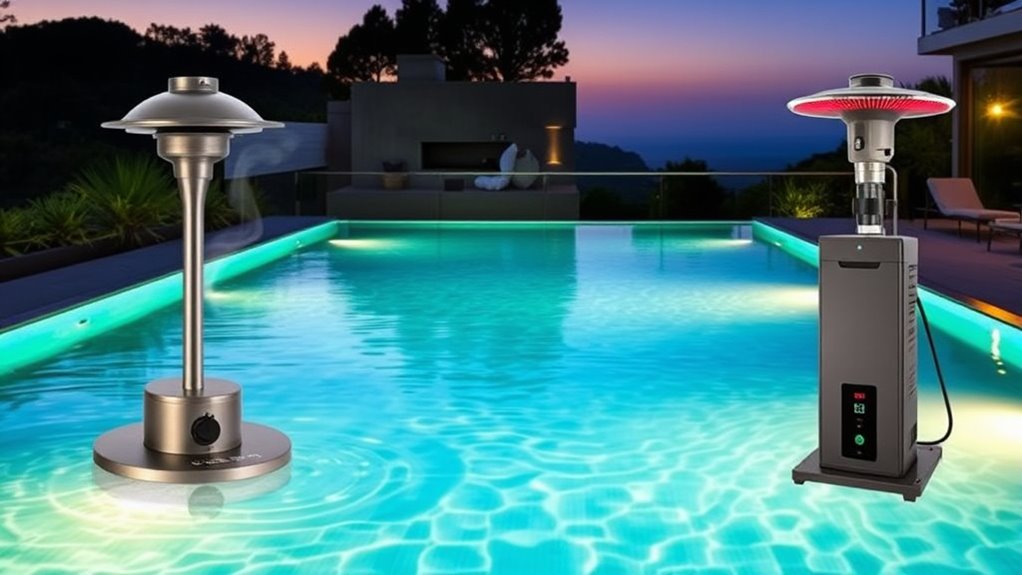
When choosing between gas and electric pool heaters, you’ll want to take into account cost efficiency, as gas heaters often cost less to operate but may have higher upfront prices. Heating speed also varies, with gas heaters warming your pool faster than electric options. Additionally, think about maintenance and durability, since gas systems typically require more upkeep but can last longer with proper care. It’s also helpful to consider industry trends, which indicate rising preferences for energy-efficient and sustainable heating solutions.
Cost Efficiency Comparison
Choosing between gas and electric pool heaters hinges on their cost efficiency, which can vary based on your usage and local energy prices. Gas heaters often have lower upfront costs but may lead to higher operating expenses if you use your pool frequently. Electric heaters tend to cost more initially but can be cheaper to run over time, especially in areas with affordable electricity. To compare:
- Gas heaters usually have lower installation costs but higher fuel expenses.
- Electric heaters are more efficient, converting more energy directly into heat.
- Long-term costs depend heavily on your local energy rates and how often you heat the pool.
- Understanding the energy efficiency of each system helps you make a more informed decision tailored to your needs.
Assess your usage patterns and local energy prices to determine which option saves you more money in the long run.
Heating Speed Differences
Gas and electric pool heaters differ markedly in how quickly they can heat your pool. Gas heaters are generally faster, able to raise your pool’s temperature in a matter of hours. This makes them ideal if you need quick heating before a swim or sudden temperature drops. Electric heaters, on the other hand, heat more slowly, often taking longer to reach your desired temperature. They’re better suited for maintaining consistent warmth over time rather than rapid heating. If you prioritize speed and occasional quick warm-ups, a gas heater is your best choice. However, if you prefer steady, ongoing heating with less fuss, electric heaters work well. Your decision depends on how urgently you need your pool heated and how often you plan to use it.
Maintenance and Durability
Gas heaters tend to require more maintenance due to their complex components and the need to keep burners and venting systems clean and functional. You’ll need to regularly inspect and service these parts to prevent malfunctions. Electric heaters, on the other hand, generally demand less upkeep because they have fewer moving parts and simpler mechanics. When considering durability, gas units often have a longer lifespan if well-maintained, but they are more prone to corrosion and wear from exposure to outdoor elements. Conversely, electric heaters are more resistant to environmental damage but may need replacement sooner if heavily used.
Here are some key points:
- Gas heaters need frequent cleaning and vent checks.
- Electric heaters require minimal maintenance.
- Durability depends on proper usage and environmental protection.
Heat Pumps: A Sustainable Heating Option
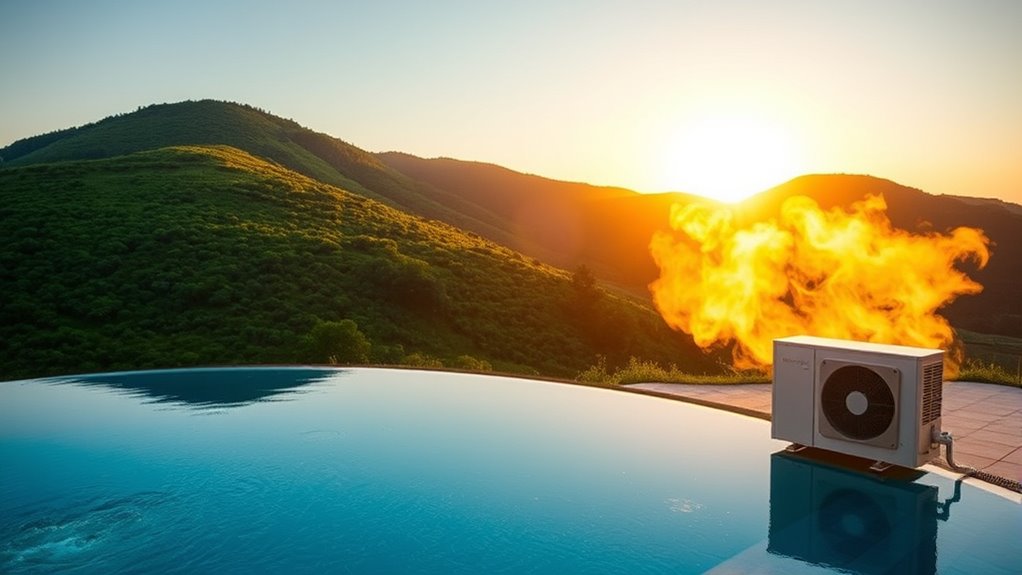
Heat pumps offer a highly efficient and environmentally friendly way to warm your infinity pool. They work by extracting heat from the air outside and transferring it to your pool water, even in cooler temperatures. This process uses considerably less electricity compared to traditional electric or gas heaters, making it a cost-effective choice over time. Because they rely on renewable energy sources, heat pumps reduce your carbon footprint. Installation is straightforward, and modern units operate quietly, so they won’t disturb your poolside experience. Plus, their durability means minimal maintenance, ensuring consistent performance. If you’re looking for a sustainable, energy-efficient solution that keeps your pool comfortably warm, heat pumps are an excellent option to think about. They combine eco-friendliness with long-term savings effortlessly. For added peace of mind, consider utilizing reliable backup power options to ensure your heating system stays operational during power outages.
Insulation and Cover Strategies to Minimize Heat Loss
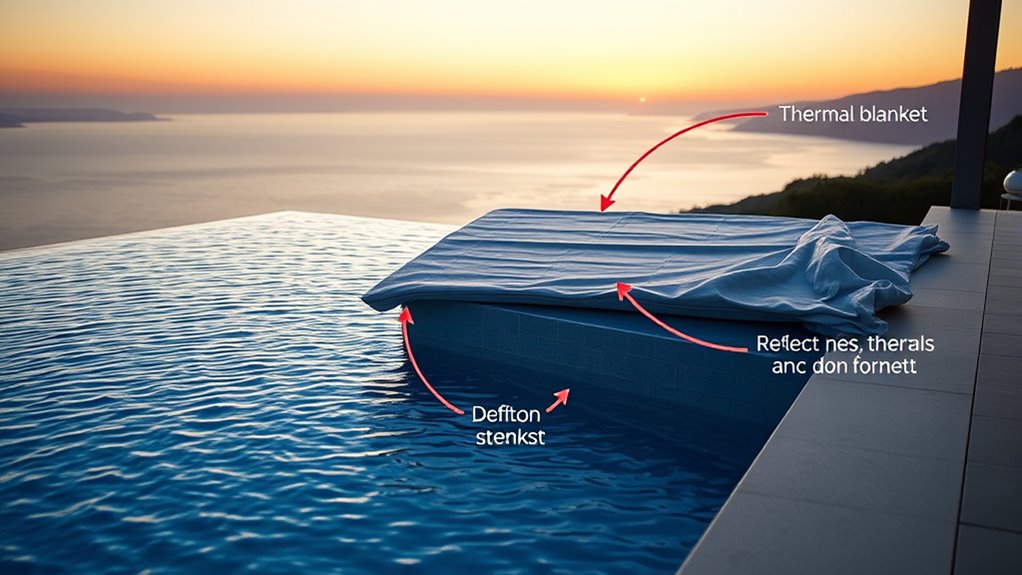
Using the right pool cover can greatly reduce heat loss when you’re not swimming. Proper insulation around the pool and its edges helps keep the warmth in and the cold out. Sealing gaps and edges ensures minimal heat escapes, making your heating efforts more efficient. Incorporating ventilation considerations can also help manage humidity and heat retention around your pool area.
Effective Pool Cover Choices
Choosing the right pool cover is essential for reducing heat loss and maintaining your infinity pool’s temperature efficiently. A good cover traps heat and minimizes evaporation, which is the biggest cause of heat loss. When selecting a cover, consider these options:
- Thermal Blanket: This is a floating, bubble-wrap-like cover that insulates the water and retains heat overnight.
- Automated Cover: A retractable cover that offers convenience and superior insulation, reducing heat loss when not in use.
- Solid Cover: Heavy-duty covers made from durable materials that block heat escape and debris, ideal for long-term coverage.
Each type offers different benefits, so choose based on your budget, convenience needs, and climate conditions. Proper cover choices can considerably improve your pool’s heating efficiency. Incorporating proper insulation techniques can further enhance heat retention and reduce energy costs.
Proper Insulation Techniques
To effectively minimize heat loss in your infinity pool, implementing proper insulation techniques is essential. Start by insulating the pool’s sides and bottom with high-quality foam or spray insulation to reduce heat transfer. Use rigid foam boards or spray foam insulation that fits snugly against the pool structure, preventing cold air from seeping in. Additionally, consider installing thermal blankets or bubble covers when the pool isn’t in use, which dramatically cut down heat loss through evaporation and convection. Insulating the surrounding deck with heat-retaining materials can also help maintain consistent water temperature. Be sure to seal any gaps or cracks around the pool edges to prevent drafts. Proper insulation keeps heat in, making your heating system more efficient and lowering energy costs. Furthermore, choosing self watering plant pots with effective insulation properties can help maintain consistent moisture levels for indoor plants near the pool area, reducing the need for additional watering and ensuring healthy growth.
Sealing Pool Edges
Sealing your pool edges is a crucial step in minimizing heat loss and maximizing energy efficiency. Properly sealed edges prevent warm air from escaping and cold air from seeping in, keeping your pool warmer longer. To achieve the best results, consider these strategies:
- Use high-quality silicone or rubber sealants around all edges and joints to create an airtight barrier.
- Install edge covers or trim that fit snugly, blocking gaps where heat can escape.
- Apply foam or rubber insulation strips along the perimeter for added thermal resistance.
Maximizing Efficiency With Proper Pool Maintenance

Maintaining your infinity pool properly is essential for maximizing energy efficiency and keeping heating costs low. Regularly test and balance the water chemistry to prevent algae growth and equipment strain, which can cause increased energy use. Clean the filters consistently to ensure proper water flow and prevent debris from clogging circulation systems. Check for leaks or cracks in the pool structure, as these can lead to heat loss and higher energy consumption. Cover your pool when not in use to minimize heat escape and reduce evaporation. Maintain appropriate water levels to ensure the pump and heater operate efficiently. By staying on top of routine maintenance, you reduce unnecessary energy waste, extend equipment lifespan, and keep your pool comfortably heated without skyrocketing costs.
Smart Technology and Automation in Pool Heating
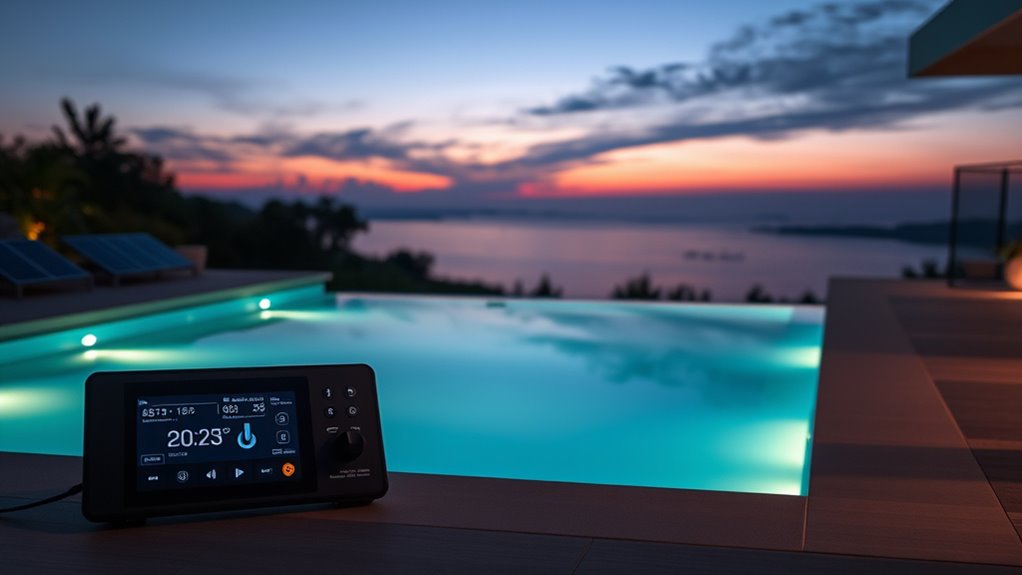
Integrating smart technology and automation into your pool heating system can substantially boost energy efficiency and convenience. With smart controls, you can program your heater to operate only when needed, avoiding unnecessary energy use. Automation systems can adjust the temperature based on weather forecasts or your schedule, ensuring ideal warmth without waste. Additionally, remote access allows you to monitor and control your pool heater from anywhere, giving you real-time updates and adjustments.
Here are three key benefits:
- Precise temperature regulation through intelligent sensors.
- Customizable schedules that align with your lifestyle.
- Energy savings by avoiding heater operation during off-peak times.
Embracing these technologies helps you save money and enjoy a perfectly heated infinity pool effortlessly.
Energy Conservation Tips for Long-Term Savings
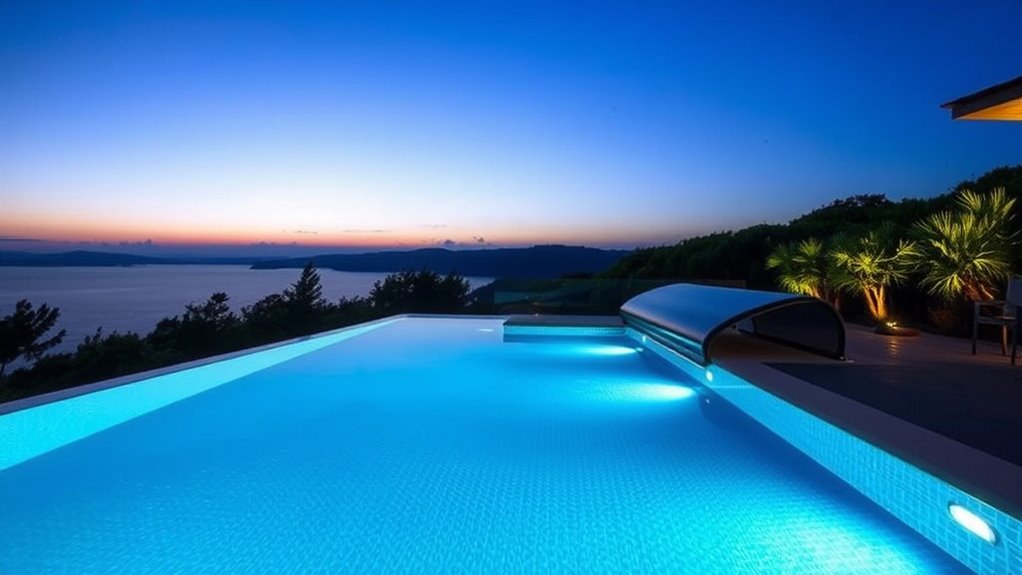
To maximize your long-term savings on pool heating, adopting simple yet effective energy conservation strategies is essential. Keep your pool covered when not in use; a quality cover minimizes heat loss and reduces the need for continuous heating. Maintain the water temperature at a moderate level instead of keeping it excessively warm, which wastes energy. Regularly inspect and service your heating system to assure ideal efficiency. Use windbreaks or barriers around the pool area to prevent heat loss caused by wind chill. Schedule heating during off-peak hours when electricity or energy rates are lower, if possible. Lastly, consider installing a timer to automate heating cycles, preventing unnecessary energy use overnight or when the pool isn’t in use. These steps can lead to significant savings over time.
Comparing Installation and Operating Costs
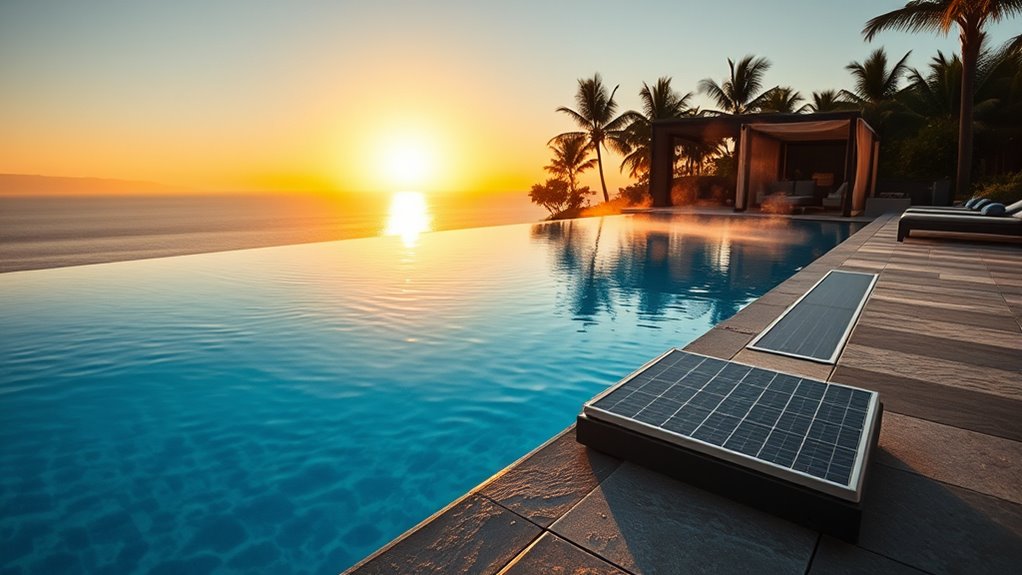
When comparing the installation and operating costs of different heating systems for your infinity pool, it’s important to contemplate both upfront expenses and ongoing expenses. Understanding these costs helps you choose the most cost-effective option.
Here are three key factors to consider:
- Initial Setup: Some systems, like heat pumps, have higher installation costs but are more efficient long-term.
- Energy Consumption: Operating costs depend on energy efficiency; systems with higher efficiency reduce your monthly bills.
- Maintenance Expenses: Regular maintenance can vary; simpler systems often cost less to keep in good shape.
Environmental Impact and Eco-Friendly Heating Practices
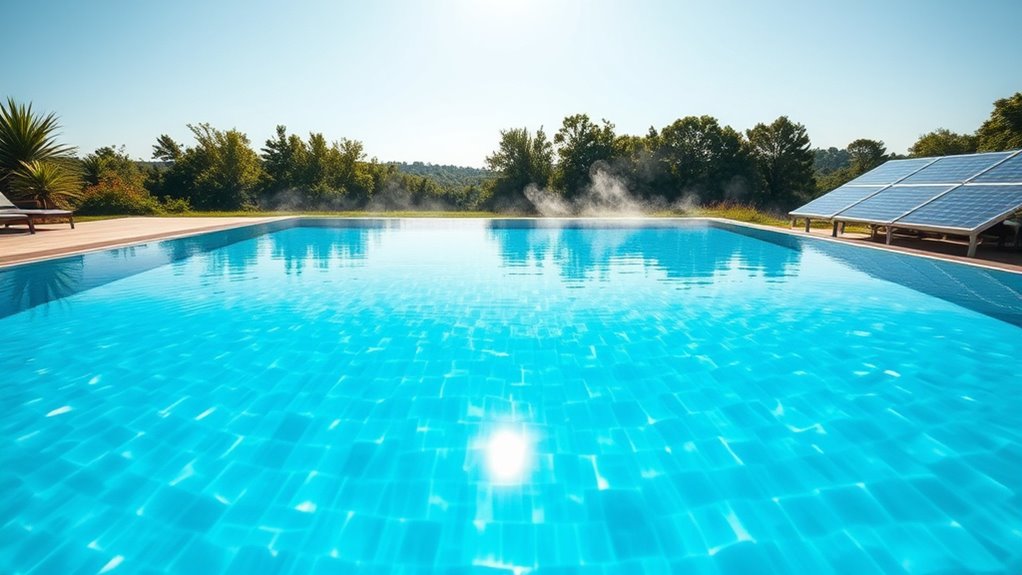
Choosing eco-friendly heating options for your infinity pool can considerably reduce your environmental footprint. Solar heaters are a top choice, harnessing free, renewable energy from the sun to warm your pool efficiently. They produce no emissions and lower energy costs over time. Heat pumps are another eco-conscious option; they extract heat from the air, using less electricity than traditional heaters, especially in moderate climates. Using a pool cover minimizes heat loss, reducing energy consumption. Additionally, consider integrating smart controls to optimize heating schedules, avoiding unnecessary energy use. By selecting these practices, you not only protect the environment but also save money in the long run. Eco-friendly heating options make your infinity pool a sustainable luxury without compromising comfort.
Frequently Asked Questions
How Long Does It Typically Take to Heat an Infinity Pool?
It usually takes between 8 to 24 hours to heat an infinity pool, depending on its size, the starting temperature, and the heating method you choose. If you use a high-efficiency heat pump or gas heater, it’ll warm up faster. To speed up the process, cover the pool when not in use, insulate well, and set your heater to a higher temperature initially, then lower it once desired warmth is reached.
Can I Combine Multiple Heating Methods for Better Efficiency?
Yes, you can combine multiple heating methods to boost efficiency. Use solar panels to harness free energy during sunny days, complement them with a heat pump for consistent warmth, and add solar covers to minimize heat loss at night. This layered approach maximizes energy savings, reduces costs, and guarantees your infinity pool stays warm longer. Combining methods lets you customize your system, making heating more effective and environmentally friendly.
What Are the Maintenance Requirements for Different Pool Heating Systems?
You need to regularly inspect and clean your pool heater, checking for corrosion, leaks, and debris. For gas heaters, ensure the burners and ventilation are clear; for electric heat pumps, keep the filters clean and fans unobstructed; and solar systems require frequent panel cleaning and monitoring of flow rates. Scheduling annual professional maintenance helps maintain efficiency, extend lifespan, and prevent costly repairs, keeping your infinity pool warm and inviting year-round.
How Does Ambient Temperature Affect Heating Performance?
Ambient temperature directly impacts your pool’s heating performance. When the air is colder, your heater works harder to maintain the desired water temperature, increasing energy consumption. Conversely, warmer ambient temperatures reduce the workload, making heating more efficient and cost-effective. To optimize performance, consider installing a cover or using solar blankets to retain heat, especially during cooler days, helping you save energy and enjoy your pool consistently.
Are There Any Safety Concerns With Advanced Pool Heating Technologies?
Safety concerns with advanced pool heating technologies are real but manageable, like steering a well-lit path. You should ensure proper installation, regular maintenance, and use safety features such as automatic shut-offs and temperature limits. Faulty wiring or malfunctioning equipment could pose risks, so always choose reputable brands and consult professionals. By staying vigilant, you keep your luxurious infinity pool safe, letting you enjoy the warmth without worry.
Conclusion
To keep your infinity pool warm efficiently, choosing the right system is key. Did you know that heat pumps can reduce energy costs by up to 70% compared to traditional heaters? By combining smart technology, good insulation, and eco-friendly options, you not only save money but also lower your environmental impact. With these strategies, you’ll enjoy a perfectly heated pool all season long while staying sustainable and budget-conscious.

